Events planning advice and materials
Find useful tools and resources to help you plan and manage your event.

Support for you
In-house or from our partners
In this section
Data protection advice and considerations
Knowing data protection guidelines and developments is crucial to any event organiser. It can lead to great reputational benefits and revenue for your business.
Event Industry Advisory Group
Find the latest information and guidance from the Event Industry Advisory Group. This includes its latest news, meeting minutes, and industry opportunities.
Event volunteering
Find out more about how volunteers can help with the successful delivery of an event. This includes best practices and resources for working with volunteers.
Food and drink at events
Discover how to improve the food and drink offering at your event.
Health and safety
Find advice and resources on health and safety at Scottish events. This includes water safety, sporting event considerations, and more.
Policing and security
Find advice on security and policing for your event in Scotland. This includes working with Police Scotland, and Counter Terrorism organisations.
Sustainable and accessible events
Find out how to deliver a sustainable and accessible event in Scotland, using our useful guides.
Training and development opportunities
Find education, training, and resources for the events industry in Scotland.